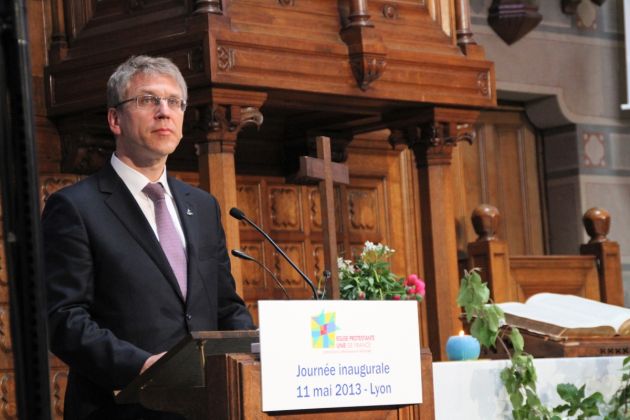French Reformed and Lutheran Christians unite in one church

French Protestants have united to form one church bringing together Reformed and Lutheran Christians in a country where Roman Catholics were once the majoriity, but where more than half the population now say they are agnostics or atheists.
"For five centuries, being Protestant in France meant not being Catholic," the president of the national council of the new United Protestant Church of France, the Rev. Laurent Schlumberger, said at the official inauguration ceremony in Lyon on May 11. "But that world has changed."
Schlumberger described the formation of the united church as a response to "immense changes" in the religious landscape of France and the result of the ecumenical movement for visible unity between churches.
The general secretary of the World Council of Churches, Rev. Olav Fykse Tveit, said at the ceremony, "The way Christians here in France – Evangelicals, Roman Catholics, Lutheran-Reformed, Orthodox, Pentecostals - manage to work together across the different confessions can also inspire and challenge Christians elsewhere.
"I am also encouraged by how your church, now united, has been so well-represented also by lay people and women in many ecumenical gatherings. I hope that over time other denominations may be inspired to join you in your united church."
Tveit added, "No one confession can be Christ's Church on its own."
French Protestants in past centuries were persecuted for their beliefs in a society in which the Roman Catholic Church accounted for the majority of the population.
Since 2008, however, more than 50 percent of people in France describe themselves as agnostic or atheist, Schlumberger noted.
As a result, Catholicism, like other religious groups, has become the faith of a minority.
"French Protestantism can no longer exist by defining itself over against another religious group," he stated. This offers "an opportunity to find a new way of being church, relevant to today's world," said Schlumberger.
"This is the great challenge facing us," he continued. "For us Protestants it involves moving on from focussing on ourselves to sharing, from being a closed group to meeting others."
Hundreds of people from throughout France and international guests from many countries joined the inauguration ceremony in Lyon.
In an address to the gathering, the French minister of the interior, Manuel Valls, responsible for relations between the government and religious communities, praised the contribution of Protestants to French society.
He noted their values and work ethic, and their role in resisting tyranny during the Second World War.
At the same time, Valls underlined the importance of France's strict separation of Church and State as a "bulwark" against intolerance and exclusion.
"This does not mean the negation of the existence of religion but a clear separation between the temporal and the spiritual," he stated.
The new church is a union of the Reformed Church of France and the Evangelical Lutheran Church of France, which together have about 450 pastors and 400 000 adherents.
Although both Reformed and Lutherans trace their history back to the 16th-century Protestant Reformation, they were divided for many centuries on doctrinal issues, such as their understanding of the Eucharist or Lord's Supper.
In 1973 an accord called the Leuenberg Agreement created a "reconciled diversity" between Lutheran and Reformed churches in Europe, Schlumberger noted in his address.
Earlier, the 1910 World Missionary Conference in Edinburgh "called us to place the mission of the church at the forefront and to see confessional identities as less important," said the church president.
In 1934 in Germany, within the Confessing Church, "the Barmen Declaration brought together Lutherans and Reformed in affirming the final authority of Jesus Christ alone in the face of Nazi idolatry." This inspired post-war Protestantism, particularly in France, said Schlumberger.
Other inspiration came from the founding of the World Council of Churches in 1948. The Second Vatican Council of the Catholic Church, which opened in 1962 demonstrated "how ecumenical hopes could be reflected within the largest church, and change it, although many had thought it to be static and unmoveable," Schlumberger recalled.